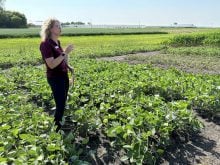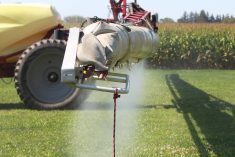A routine submission for higher maximum residue limits has snowballed into sweeping proposed reforms at Canada’s Pest Management Regulatory Agency.
In May of 2021, the PMRA proposed increasing glyphosate MRLs on a variety of pulses and other products such as barley bran, wheat germ and rolled oats.
The proposal was in response to an application by Bayer CropScience to have Canada’s MRLs aligned with CODEX MRLs stemming from a 2019 joint recommendation from the United Nations’ Food and Agriculture Organization and World Health Organization.
The PMRA’s proposal ignited a firestorm of criticism from media outlets in Quebec.
Read Also

Canola oil transloading facility opens
DP World just opened its new canola oil transload facility at the Port of Vancouver. It can ship one million tonnes of the commodity per year.
The intense public pressure culminated in an Aug. 4 Health Canada announcement that it was pausing any proposed increases to MRLs for glyphosate and any other pesticides and that it would be conducting a review on targeted aspects of the Pest Control Products Act.
It was a big deal. Three federal cabinet ministers were trotted out to make the announcement — Patty Hajdu, minister of health, Marie-Claude Bibeau, minister of agriculture and Jonathan Wilkinson, minister of environment and climate change.
“This ultimately resulted in the birth of what is now known as the PMRA Transformation Agenda,” said Terri Stewart, executive director of chemistry with CropLife Canada.
Farm groups and farm chemical companies are concerned that agenda could result in a system where politics trumps science and valuable crop protection products are removed from the marketplace.
“There is the potential to seriously impact the availability of important tools that are needed by many sectors,” she told delegates attending Canola Week 2022.
The “targeted” Pest Control Products Act review has morphed into a broad, far-reaching evaluation with a focus on transparency and “unprecedented” public engagement.
There is the potential for that process to turn into legislative changes in 2023.
“They are moving at a very, very fast pace with their initiatives,” she said.
In fact, the process is unfolding so rapidly that it is hard for stakeholders to provide well thought-out feedback on the proposed changes.
One of the crop protection industry’s biggest concerns is the establishment of a Science Advisory Committee to provide “independent advice” to the PMRA.
CropLife contends there is a lack of agricultural and regulatory experience on the committee.
It worries that the committee will impede the agency’s ability to make timely decisions and claims there is a lack of transparency surrounding its deliberations and recommendations.
CropLife is concerned there will be too much focus on finding compromises rather than maintaining a science-based approach to regulating pesticides.
“There is a major concern with the political motivations behind many of the initiatives and the impact it might have on PMRA’s ability to stay risk-based,” said Stewart.
For instance, there has been no scientific rationale provided for the pause on applications to increase MRLs.
That pause was initially supposed to last until the spring of 2022, but it remains in place nearly 500 days after the Aug. 4 announcement.
“It has had serious impacts on the PMRA’s reputation as a science-based regulator,” she said.
Stewart and other industry officials were asked if the federal government is abandoning its longstanding science-based approach to regulation.
“Although they are saying the intention is to remain science-based, we do see a lot of things moving away from science,” she said.
Jim Everson, president of the Canola Council of Canada, said it is hard to view the Aug. 4 announcement as anything but politics as it occurred on the heels of a fierce public debate in Quebec just before a federal election.
He said that although the rhetoric in Ottawa continues to be about science-based regulations, the government’s actions tell a different story.
Everson considers the Aug. 4 announcement a “call to action” for the agriculture industry to ensure Ottawa reinstitutes a science-based system.
“Maximum residue limits are not a safety issue, they are a trade orientation issue,” he said.
The one area of the transformation agenda that holds promise for the agriculture sector is the modernization of PMRA’s business processes. The hope is that will result in more efficient ways to conduct product reviews.
“The current system is not working and it’s impacting access to innovation,” said Stewart.
The agenda also calls for the collection of more real-world data. The government has set aside $42 million to help pay for initiatives like a pesticide water monitoring program.
Stewart said that is all well and good, but the government needs to first and foremost fund the core work that occurs at the PMRA because the agency has been underfunded for years, which has led to a backlog of reviews.
She hopes the agriculture sector will continue to speak with a united voice about its concerns with the transformation agenda.
To date, there has been a high degree of alignment between farm groups and the crop protection industry on this topic.
“It’s not the time to take the foot off the pedal,” said Stewart.
















